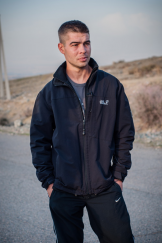Working-through the personality
The epilogue to the Italian’s trick is presented in the eighth episode to the limit of moralization. With the presence of the chief physician, the rational dialogue between the assisting persons didn’t happen. Participants generally made three options related to the provocative behavior of the Italian. The first option is as temperamental as Anatoliy. Three months of prison was enough to comment on the act done by the Italian, it was "not as others do". In the moments of tension, he admits that he would kill the Italian, and considers it necessary to kick him out from the project. "There is hatred," - he says with excessive emotionality.

Anatoliy’s flattened cheekbones are directly opposite to the pursuit of a non-presence, and the non-existence of Victor Malleker. Victor, without knowing it, calls everyone to escape the responsibility for their misdeeds. He should gather his belongings and leave, because it is unclear how to look in the eyes of the rest, after you put the entire group against yourself. In previous episodes, Victor was about to kill himself on the advice of his father, chip in to the river Rhine, hang himself because of the hopelessness and despair, he prefers to leave instead of a public execution. Suicidal tendencies are encountered with insoluble problems, and Victor is in the center of this conflict. Not surprisingly, the Italian doesn’t listen.

The third and probably the most peaceful way to treat the Italian, is to ask: "who are the judges?" Amazingly, Gleb , who usually doesn’t stay aside, sticks to this third option: "Half of the participants think so, and the other half ... don’t know"- he suddenly wedges in the judgment of the Italian, on the balcony of one of the rooms. Lynching stumbles over what has been said already and indisputably falls under the question. The thoughtful and sober conversation of the assisting relatives turns to the point of differentiating of who is a “pseudo-educated person" and who "does not know how to read and write". Remarkably, the participants avoided the real issue of the conversation going in a confrontation on the individual level.

Something new to the reality show brings the comments of the Professor Nazaraliev, to whom all the involved parties of the conflict appeal. "The Italian did not abuse drugs, and because he could refuse, we will give him a chance to go until the end," – Professor says. However, it is not clear, whether the Italian will undergo the Mindcrafting and final stage of treatment or the concilium of doctors will deny him in the pilgrimage and the stress-energy therapy. Whatever it was, he is going to Issyk-Kul Lake with all the participants, where he will think about his personality.
"He already has a yellow card, figuratively speaking," - Professor Nazaraliev says. "The Mindcrafting program "blows" the volition, - he explains. - Maybe he will have a breakthrough". The other participants also are waiting for the breakthrough, but the Italian, seems to be far from it - he complains about the reality show producers who make the rules after their violation. But the Italian refers to the cameras, he believes they will make everything obvious and that’s why the conflict will not escalate. Was it worth to make such a mess for the Italian for the sake of hearing: "Good job!”? Well, everyone will decide for himself. At least, none of the involved parties did not offer a universal moral conclusion.
At the end of the episode the project participants are taken to the Tashtar-Ata Mountain, where they found out about its importance to the pilgrims with drug dependency. This marks the transition to the second phase of psychotherapeutic treatment. The physiologists will be replaced by psychologists and coachers, but it will not be easy to the participants anyway. Anatoliy draws an analogy with the space rocket and not without pleasure, talks about the first fallen off foot. On a hillside the participants are looking for the stones based on the principle of cognitive metaphor, similar to their internal state and equal to their painful gravity. Such stones in the method of Professor Nazaraliev are called "stones of the soul", and work with them is a lapido-psychological therapy.

After finding his "vessel for negativity" Gleb, asks Ekaterina: "Do you like my stone?", which can be understood as "Do you like me?" At the end of the first phase of treatment, Gleb has a need in the society and the desire to be liked by others. Compared to others Gleb also talked about the subtle meaning of a stone and the work with it: "All my sins are here. That's why the stone chose me. And then I'll break it, and there will be diamonds. There is a chance, but small".
One may practice in the art of interpretation in the manner of Sufi, but diamond is a metaphor of the crystal clear state of mind, after rehabilitation. Anatoliy corrects Gleb: "There is a chance, and a big one!"

























